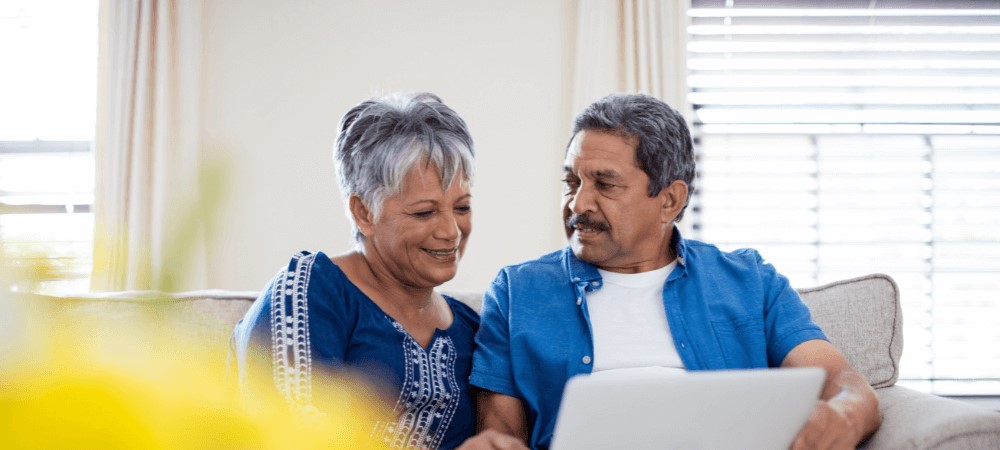How Technology to Help Seniors is Changing Lives

The world of technology is constantly evolving, and while it may seem intimidating to some, technology to help seniors can assist them with being safer, healthier, and more connected. From staying in touch with family to managing health and wellness, technology is no longer just for the younger generations—it’s a vital resource for “aging in place” and maintaining independence. Understanding the right technology to help seniors is the first step toward a more comfortable and secure future.
Bridging the Distance with Communication Tools
Isolation is a significant concern for many seniors, but technology can make it easier than ever to stay connected with loved ones, no matter the distance. This form of technology to help seniors focuses on social well-being.
- Video Calling Platforms: Apps like FaceTime and Zoom have revolutionized communication. They allow seniors to see their family and extended family in real-time, making virtual conversations feel more personal and reducing feelings of loneliness. Many of these apps have user-friendly interfaces, and with a little practice, they become second nature.
- Social Media: Platforms like Facebook are great for staying up-to-date with family events, seeing photos of new babies or a change of scenery, and even joining groups based on shared hobbies or interests. This provides a digital community that can be a valuable source of connection and mental stimulation.
- Specialized Tablets: Devices like the GrandPad are designed specifically for seniors. They feature large, easy-to-read buttons, a simplified interface, and pre-loaded apps for video calls, photos, and games, making them incredibly accessible for those who are less comfortable with traditional tablets. This is a great example of specialized technology to help seniors overcome learning curves.
Smart Home Technology for Safety and Convenience
The “smart home” is about more than just convenience—it’s about creating a safer and more secure living environment. This is a crucial type of technology to help seniors maintain their independence at home.
- Voice-Activated Assistants: Smart speakers like Amazon Echo and Google Home are a game-changer. With simple voice commands, seniors can control lights, adjust the thermostat, set medication reminders, and even get news or weather updates. This is particularly helpful for those with mobility issues or vision impairment.
- Smart Security Systems: Smart doorbells and locks allow seniors to see who is at the door without having to answer it, providing an added layer of security. Motion sensors and smart smoke detectors can also alert family members or caregivers to any unusual activity.
- Automated Devices: From robot vacuum cleaners to smart pill dispensers, these devices reduce the physical burden of daily tasks and can help ensure proper health management.
Health and Wellness at Your Fingertips
Technology is playing an increasingly large role in personal health management, helping seniors monitor their well-being and stay on top of medical needs. This specific application of technology to help seniors can be life-saving.
-
- Wearable Devices: Smartwatches and fitness trackers can do more than just count steps. Many offer features like fall detection, which can automatically alert emergency services or family members in case of a fall. They can also track heart rate, sleep patterns, and other vital signs, providing valuable data for both the individual and their healthcare providers.
- Medication Management Apps: Apps like Medisafe provide reminders for taking medications, helping to reduce the possible risk of missed doses.
Assistive Technology for Everyday Living
For seniors with specific physical or sensory disabilities, assistive technology provides crucial support. This specialized technology to help seniors addresses specific challenges head-on.
- Visual and Auditory Aids: Screen readers and text-to-speech systems can help those with visual impairments navigate computers and smartphones. Similarly, smart hearing aids and captioning apps can significantly improve communication for those with hearing loss.
- Mobility and Safety: GPS trackers can be an invaluable tool for seniors with memory loss, allowing caregivers to monitor their location and provide peace of mind. Automated jar openers and other adaptive kitchen tools can also make daily tasks easier for those with arthritis or limited hand strength.
Embracing the Future
At Robson Reserve at PebbleCreek in Goodyear, AZ and Robson Reserve at Sun Lakes near Chandler, AZ, technology to help seniors is woven into the fabric of the community to enhance residents’ independence, security, and connection. Recognizing that technology can be a valuable tool, both communities offer a variety of technology Q & A classes, as well as technology presentations to help residents become more comfortable with new devices and platforms. The goal of using technology to help seniors isn’t to replace face-to-face moments, but to supplement them. It gives residents the power to stay connected with loved ones and the world around them, all while building a rich and active social life within their community.




